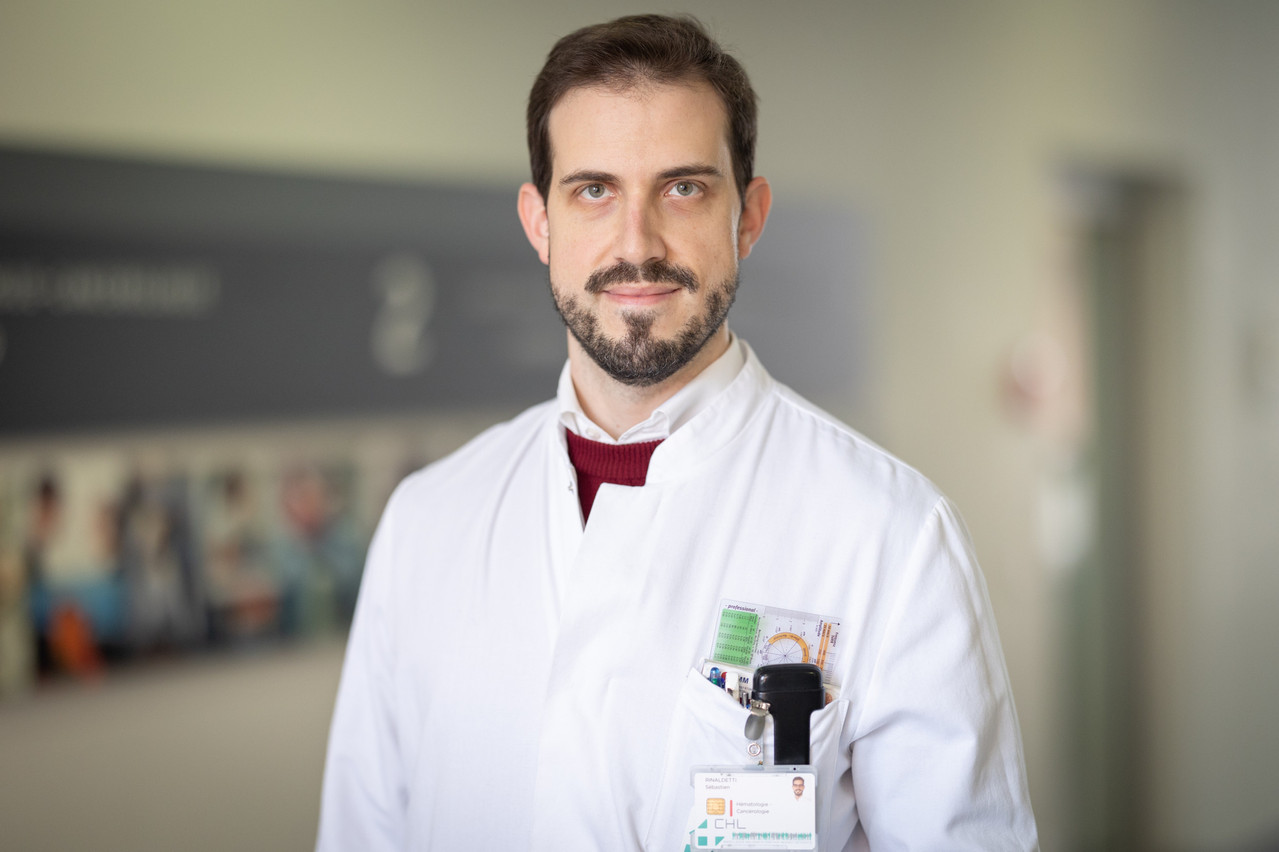Every year, around 1,100 people in Luxembourg die of cancer, says the country’s health ministry. It is the leading cause of death for men (32% of deaths) and the second cause of death for women (26%) in the grand duchy.
“Today, to work in haemotology oncology, it’s still a very tough specialisation because you don’t get used to the fact that you will lose patients because of cancer. Even if you are working years on it, it’s always hard to lose patients,” began Sébastien Rinaldetti, a physician-scientist who works at the CHL. “Nevertheless, it is one of the most exciting times in the field of haemotology oncology.”
There are “many new kids on the block,” said Rinaldetti, meaning there are lots of new drugs in the production pipeline. Thanks to new technology, such as “gene scissors” called Crispr/Cas9 for which the Nobel Prize in chemistry was awarded in 2020, and novel robotics, the high-throughput screenings that allows automated testing of many compounds, once only possible in large pharmaceutical companies, are now feasible in academic labs. “You have enormous acceleration of the process of drug discovery these days,” explained Rinaldetti.
More research spending in the US
In 2018-2019, Rinaldetti carried out a postdoctoral fellowship at the University of Colorado, where he worked on 3D cell cultures. His experience highlighted the “huge differences” in spending on research and development between the US and other countries.
For example, the Cancer Moonshot programme was launched in America in 2016, which aimed to reduce the cancer death rate by at least 50% over the next 25 years. The 21st Century Cures Act saw Congress invest $1.8bn to fund cancer research.
The venture capital industry in the US has also supported the formation of many spinoff companies, Rinaldetti said, which are “nurtured by the findings from academics.” Moreover, many of the projects he was involved in were funded by the department of defence. “This is also something that makes a difference, because it’s not in every country where the department of defence is putting so much money into research.”
So why Luxembourg?
On choosing the grand duchy, Rinaldetti said that “one argument is family.” The physician-scientist is from Luxembourg and did his medical studies in Austria, followed by clinical internships in Brussels and Montpellier, as well as specialist training in Mannheim and Heidelberg. “But even if I didn’t have some family, my decision would have been the same and that I’m 100% sure of.”
“It’s because we are right now doing high-impact research in Luxembourg,” he continued. “Many publications have already demonstrated that. And we have the technology to do high-impact research--it is there in Luxembourg.”
One of Rinaldetti’s current research projects, for example, focuses on the development of a screen that can identify patients that have chronic myelogenous leukaemia (CML) and see if they have been cured or not. Patients with leukaemia can be treated with drugs called tyrosine kinase inhibitors. Some patients have to keep taking the drugs for the rest of their lives, but some can stop. The screen aims to identify patients who can stop taking the drugs, and those who need to continue.
This project is being developed in collaboration with Germany, but in parallel, Rinaldetti is launching a study on immune profiling in cancer patients.
Read also
On a financial and educational level, the grand duchy is also attractive. “The financing--we are a rich country--is also increasing from year to year. And I think it’s becoming more and more attractive, especially since they [the University of Luxembourg] already created a bachelor’s in medicine.” A specialisation in oncology is now also available in Luxembourg.
“There is an academic setting that is developing, that’s making it very interesting, and we have everything in place, like the LIH and the IBBL--the Integrated BioBank of Luxembourg--and the university, to do high-end and cutting-edge biotechnology in the field of cancer,” said Rinaldetti. The LIH also launched the National Centre for Translational Cancer Research, which aims to provide patients with access to clinical studies and treatments.
“The second argument is that I’m still a physician, and you use very expensive drugs in haemotology oncology, and as a physician do you want to work in a health system like the one in the United States?” he said. “It’s a very tough thing, and it’s not something I would want.”
In addition, the Luxembourg ministry of health proposed, at the end of 2022, to pay 30 to 50% of the salary of a physician who works as a physician-scientist. “You need to prove that you are engaged in science and that you have already a scientific basis,” Rinaldetti said. The health ministry would pay a portion of the physician-scientist’s salary in order compensate the hospital for the work that the physician cannot do because they are working on research projects.
Most promising developments in the field?
“It’s difficult to answer,” said Rinaldetti, but for him, there have been three major developments in the past decades. “We have the start of the personalised medicine era, with smart molecules. After that, the second era was started by biologicals. This era was characterised with antibodies that were developed to target specific antigens against cancer. And then the third group--the biggest wave that’s now coming--is immunotherapy. And immunotherapy is now revolutionising the whole field.”
New drugs are now emerging in all these fields, explained Rinaldetti. “You have a huge range of novel treatments.” There are bispecific antibodies, vaccination against cancer and CAR T-cells, to name just a few. Spinoffs and small companies founded by academics are now being bought up by bigger companies.
But it’s important to raise awareness about these new technologies and treatments. “The government wants biotech to be a socioeconomic pillar and basis of the Luxembourgish economy,” said Rinaldettii. “And this is really something that people need to get more sensitised with.”
